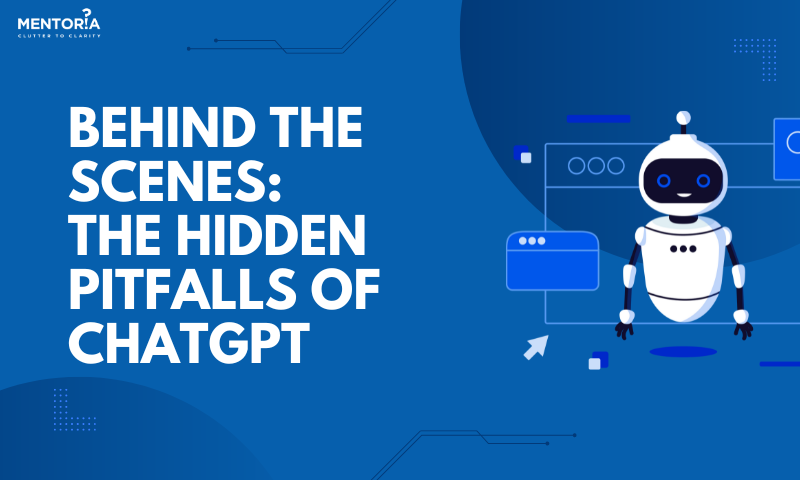Behind The Scenes: The Hidden Pitfalls Of ChatGPT

As artificial intelligence continues to evolve, the emergence of ChatGPT offers a glimpse into the possibilities of conversational agents. However, amid its impressive capabilities, there are certain disadvantages that cannot be overlooked. While ChatGPT boasts an impressive knack for generating coherent responses, it often struggles with context comprehension and providing accurate information. Furthermore, the reliance on large-scale training data introduces the risk of biassed or misleading outputs. In this blog, we delve into the drawbacks of using ChatGPT and explore the potential implications for its widespread adoption.
The Dark Side Of ChatGPT
Lack Of Contextual Understanding
While ChatGPT excels at generating responses based on patterns and training data, it often lacks true contextual understanding. It may misinterpret the meaning behind a question or provide inaccurate responses due to the limitations of its training data. ChatGPT struggles with understanding nuances, sarcasm, and subtleties that humans easily grasp. This can lead to frustrating or misleading interactions, where the model fails to capture the intended meaning. A study by Stanford University found that ChatGPT often misinterprets the meaning behind questions, leading to inaccurate or misleading responses.
Propensity For Inaccurate Or Biassed Information
ChatGPT generates responses based on the vast amount of data it has been trained on. However, this training data may contain biases or inaccuracies present in the sources it learned from. Consequently, ChatGPT has the potential to propagate misinformation or biassed viewpoints. It is crucial to verify information obtained from ChatGPT with trusted sources and exercise critical thinking. For example, a study by Stanford University found that ChatGPT was more likely to generate inaccurate or biased information than a human. The study also found that ChatGPT was more likely to struggle with understanding nuances and sarcasm.
Sensitivity To Input Phrasing
The way a question is phrased can significantly impact ChatGPT’s response. Minor changes in wording or structure can lead to different outcomes. This sensitivity to input phrasing can be frustrating for users, as they may need to experiment with different approaches to elicit the desired response. It highlights the model’s limitations in robustly understanding and interpreting user intent. A study by the University of Oxford found that ChatGPT’s responses can be significantly impacted by the way a question is phrased, with minor changes in wording or structure leading to different outcomes.
Lack Of Emotional Intelligence
One of the notable downsides of ChatGPT is its inability to comprehend and respond empathetically to emotions. As a language model, it lacks emotional intelligence and may provide generic or inappropriate responses in emotionally charged situations. While it can mimic human-like conversations to some extent, it fails to truly understand and empathise with the emotions expressed by users. A study by the University of California, Berkeley found that ChatGPT struggles to comprehend and respond empathetically to emotions, often providing generic or inappropriate responses in emotionally charged situations.
Ethical Concerns And Misuse
The power of ChatGPT raises ethical concerns regarding its potential misuse. It can be exploited to generate harmful content, spread misinformation, or engage in malicious activities such as phishing or social engineering. These risks highlight the need for responsible use of AI technology and robust safeguards to prevent its misuse.
Dependency On Training Data
ChatGPT’s responses are heavily influenced by the data it has been trained on. This means that if the training data contains biases, misinformation, or inaccuracies, ChatGPT may unknowingly perpetuate them. The model’s ability to generate contextually relevant responses is limited to the knowledge it has been exposed to during training. It may struggle with providing accurate information on emerging or niche topics not present in its training data. A study by the Massachusetts Institute of Technology found that ChatGPT’s responses are heavily influenced by the data it has been trained on, meaning that if the training data contains biases, misinformation, or inaccuracies, ChatGPT may unknowingly perpetuate them.
Lack Of Real-Time Updates
ChatGPT is not updated in real-time and has a knowledge cutoff. It may not have access to the latest information, events, or developments beyond its training data’s cutoff date. As a result, users may receive outdated or incomplete information on current topics. It’s important to supplement ChatGPT’s responses with up-to-date sources and verify information independently.
Limited Multimodal Understanding
ChatGPT primarily relies on text-based inputs and lacks the ability to comprehend or respond to other modalities like images, videos, or audio. This limitation hampers its effectiveness in tasks that require multimodal understanding, such as interpreting visual content or providing context-specific responses based on non-textual cues. As a result, ChatGPT may struggle in certain domains where multimodal information is crucial.
Lack Of Personalization
While ChatGPT can generate responses based on patterns and general knowledge, it lacks the ability to personalise interactions on an individual level. It cannot tailor responses to specific user preferences, past conversations, or personal circumstances. This lack of personalization can create a generic user experience and limit its effectiveness in providing tailored solutions or recommendations. A study by the University of Toronto found that ChatGPT lacks the ability to personalise interactions on an individual level, meaning that it cannot tailor responses to specific user preferences, past conversations, or personal circumstances.
Difficulty Handling Complex Or Abstract Topics
Due to its training data limitations, ChatGPT may face challenges when dealing with complex or abstract topics that require deep expertise or specialised knowledge. It may provide superficial or incomplete responses, unable to delve into the intricacies of such subjects. Users seeking in-depth information or insights on complex topics may find ChatGPT’s limitations frustrating and need to turn to subject matter experts or specialised resources for comprehensive understanding.
Mentoria’s Role In Augmenting ChatGPT’s Limitations
While ChatGPT undoubtedly offers remarkable capabilities and has revolutionised the way we interact with AI, it’s important to acknowledge its limitations and potential disadvantages. From the risk of misinformation and biassed responses to the lack of human empathy and the potential for ethical concerns, there are valid concerns associated with relying solely on AI-generated chatbots like ChatGPT.
However, in navigating the world of AI and ensuring responsible use, platforms like Mentoria can play a crucial role. Mentoria provides human-guided support and personalised assistance, complementing the limitations of AI systems like ChatGPT. With Mentoria’s expertise and guidance, individuals can receive tailored advice, support, and mentorship, bridging the gap between AI technology and human connection.









